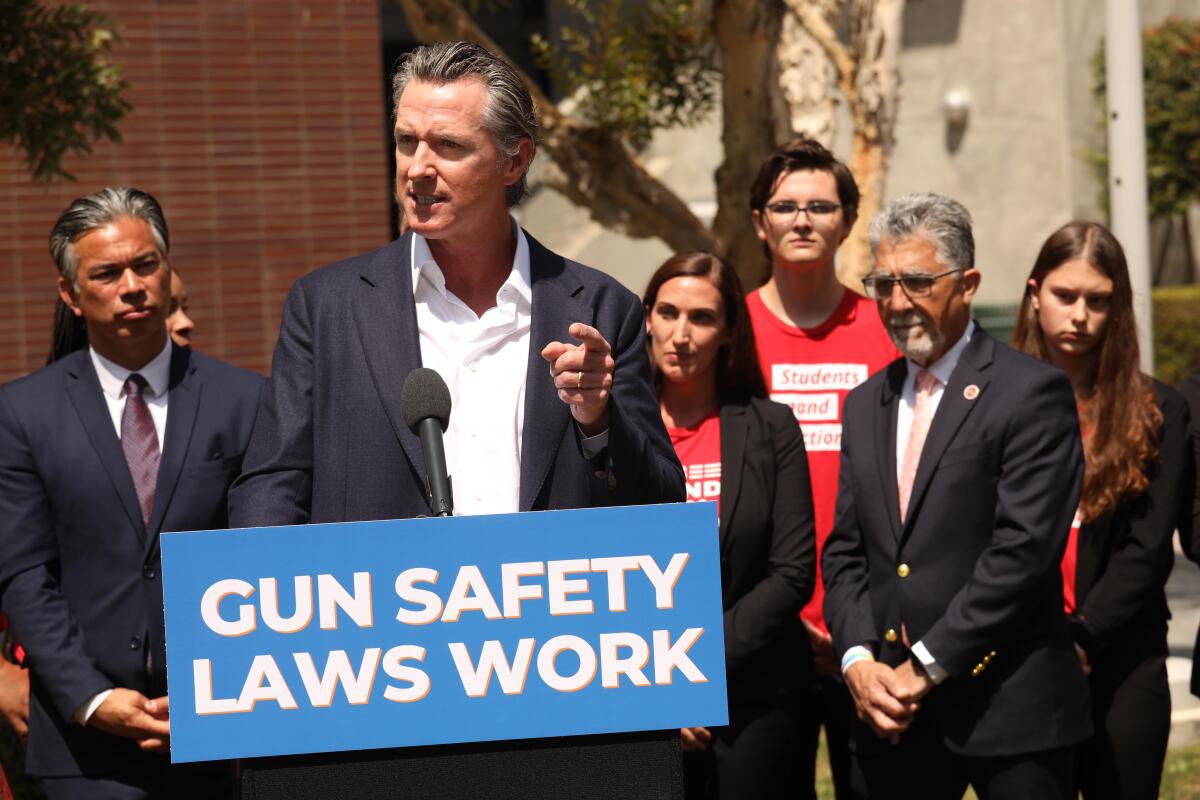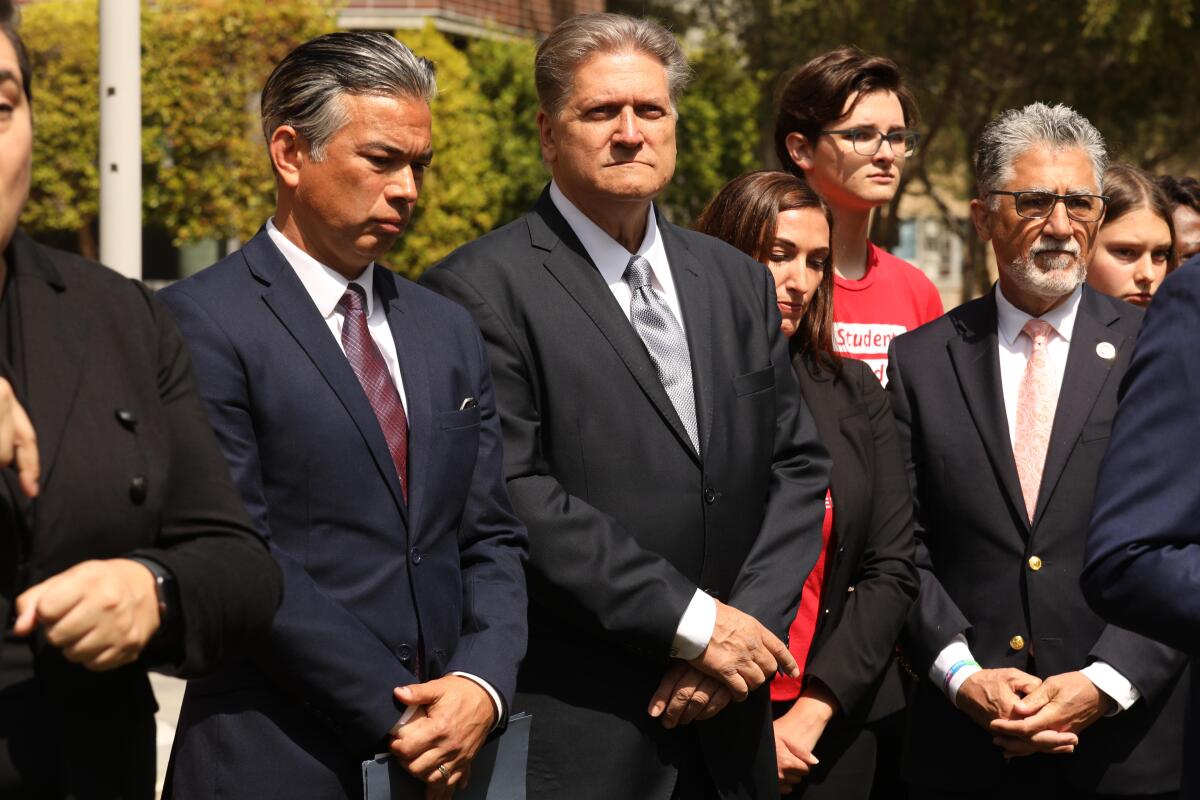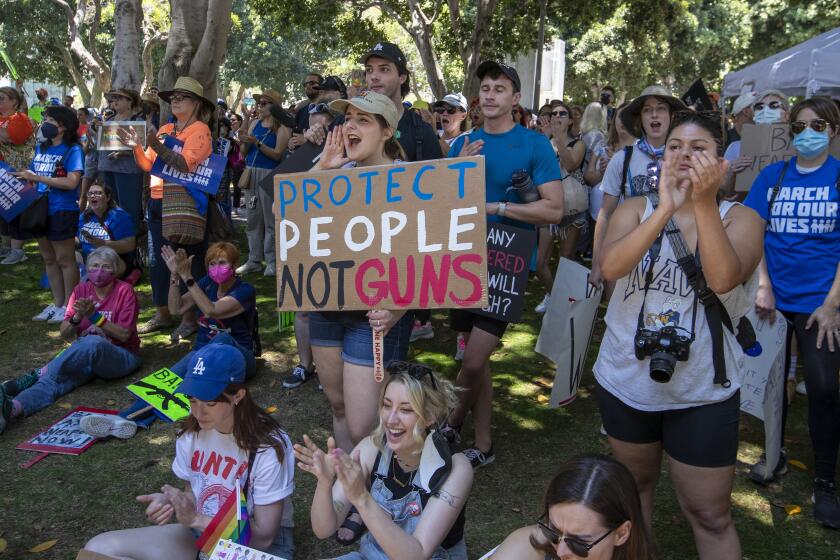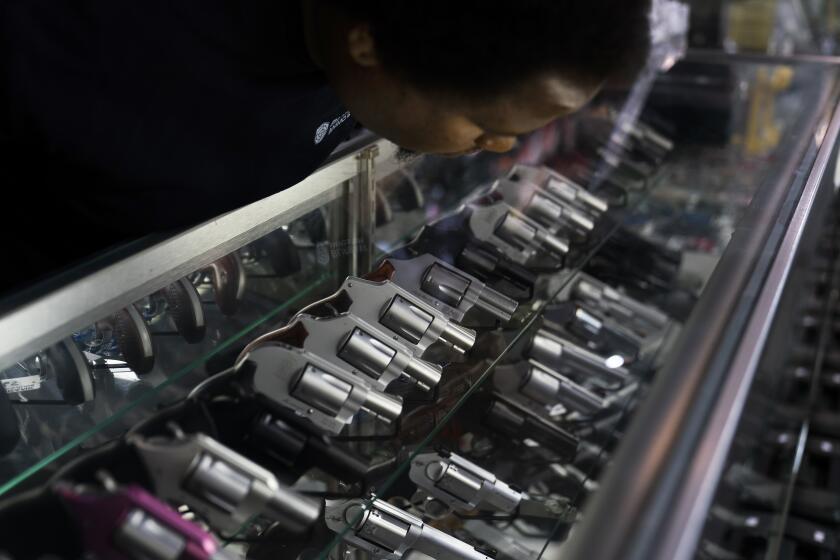California Democrats try again to rewrite concealed-carry gun law

Five months after a high-profile gun-control bill died amid Democratic infighting in Sacramento, California lawmakers are trying to revive the legislation to strengthen the state’s restrictions on who can carry loaded firearms in public.
The legislation was filed in response to a U.S. Supreme Court ruling that struck down restrictive concealed-carry laws as unconstitutional. The 6-3 decision by the court’s conservative majority in June sent New York, California and a handful of other blue states scrambling to rewrite their laws governing how people get licensed to carry concealed weapons.
Gov. Gavin Newsom and a coalition of top Democrats quickly got behind a bill last year that they said would comply with the Supreme Court decision barring states from making people show a “special need” for concealed-carry permits while still maintaining stringent protocol for issuing them.
But gun-rights advocates earned a rare and unexpected victory on the final night of the legislative session, when bickering among Assembly Democrats tanked the measure.
Newsom vowed to work with lawmakers on another proposal this year, Senate Bill 2, saying that it was one of his top priorities this year and that he was resolved to sign it.
“Gun safety saves lives. More guns, more lives lost,” Newsom said during a Wednesday news conference in Sacramento. “We fell short last year... that’s not going to happen this year. No question about that.
“I will be signing this legislation,” he said.
Newsom joined state Sen. Anthony Portantino (D-La Cañada Flintridge) and Atty. Gen. Rob Bonta at the news conference, where they detailed how they plan to get this year’s version signed into law. To start, the new version of the legislation includes a procedural change from last year’s bill that makes it easier to pass.
The Democratic trio are expected to argue that a recent wave of mass shootings in the state warrants bold action, and attempt to draw a distinction between California’s gun laws to those in Republican-led states like Texas and Florida, the latter of which is considering legislation to allow residents to carry concealed firearms without a permit.
The bill, unveiled in response to a Supreme Court ruling, was a backup plan to let California keep restricting who can get a gun license. It failed.
But rather than changing the legislation to respond to criticism that it was too restrictive to meet the Supreme Court’s newly defined constitutional standard, Democrats are plowing forward with essentially the same bill as before.
“Our goal is to make Californians safe,” Portantino said. “We’re hitting this from every level because it warrants it. And Californians demand that we do it.”
Portantino’s bill, like last year’s, includes a lengthy list of so-called sensitive places where firearms would be prohibited, such as government buildings and schools, medical facilities, public transit, places of worship, parks, playgrounds and bars.
It also requires a robust licensing protocol for local officials — largely sheriffs’ departments — to follow when issuing permits, including in-person interviews with applicants, obtaining three character references and reviewing social media and other publicly available statements to identify safety risks.
The bill also prohibits concealed-carry licenses to anyone under 21, the same age required to purchase a handgun in California, and adds new firearms training and storage regulations.
Proponents say these rules would thread the needle between honoring the court’s decision and making sure guns don’t fall into the hands of dangerous people. But it’s a risky strategy.
The Supreme Court’s decision in New York State Rifle & Pistol Assn. vs. Bruen focused on whether “may-issue” laws were constitutional — laws that granted licensing authorities broad discretion over who can publicly carry a firearm. Most states have “shall-issue” laws on their books, meaning permits are granted once an applicant meets the licensing criteria.
Firearm owners had argued that New York’s requirement for applicants to demonstrate “proper cause” for a permit — such as for self defense — had violated their 2nd Amendment rights. The Supreme Court’s six conservative justices agreed, and struck down the law as an infringement on a person’s right to self-defense outside the home, immediately rendering California’s “good cause” standard as similarly impermissible.
The Supreme Court’s overturning of a New York law restricting people’s right to carry firearms in public has reinvigorated a legal war on California’s gun laws.
Writing for the court, Justice Clarence Thomas argued that these laws inhibit “law-abiding citizens with ordinary self-defense needs from exercising their right to keep and bear arms.”
States could still prohibit firearms in or near a limited few sensitive places that have historically been off limits and are therefore “settled,” Thomas wrote, including schools, government buildings or polling places. In a concurring opinion, Justice Brett M. Kavanaugh and Chief Justice John G. Roberts Jr. argued that states were still generally allowed to require objective licensing criteria, such as firearms training, fingerprinting and background and mental health checks.
Portantino said SB 2 follows the court’s guidance on sensitive places and licensing rules, and that the legislation falls within those outlined legal boundaries.
Sam Paredes, executive director of Gun Owners of California, disagreed.
Paredes said the bill’s licensing regulations are unconstitutionally subjective, and that the extensive list of sensitive places would effectively designate the entire state as a gun-free zone, making a concealed-carry permit “useless in California.”
He’s one of several gun rights advocates who plan to sue the state over SB 2 should it be signed into law.
“We are prepared to challenge absolutely everything,” he said. “They’re going to have to change some directions. If they don’t, then they are forcing us to go to court, to win yet again. And we are prepared to do that.”
That’s where things could get interesting.

Courts are still trying to figure out how to interpret the Bruen decision with what little instruction the Supreme Court provided, said Andrew Willinger, executive director of the Duke Center for Firearms Law.
New York, for example, is once again facing significant legal challenges opposing a new concealed-carry law it passed after the Bruen decision, giving some idea for how things might go in California should SB 2 pass.
Bonta signed on to a legal letter last month with other attorneys general urging a federal court in New York to let the law stand, arguing that strong concealed-carry rules “keep guns out of the hands of dangerous individuals, and away from places where people gather to travel, live, and work.”
Certain provisions of California’s bill, which is very similar to New York’s updated law, could more easily pass constitutional muster, Willinger said, including training requirements, some of the sensitive places and the character references requirement.
Ultimately, though, “Bruen just leaves a lot of these questions open,” he said.
Adam Winkler, a UCLA professor and constitutional law specialist, said arguments against the number of places deemed sensitive by the California bill might raise a good point. Some places could be truly sensitive, he said, such as schools. But a judge might decide that “the cumulative effect of all of these restrictions is too much.”
“I do think there is a valid concern that law-abiding people will end up violating the law unknowingly,” Winkler said.
Republicans on Wednesday criticized SB 2 as a misguided attempt to end gun violence by demonizing not those who illegally possess guns, but lawful firearm owners who they said will be unfairly affected by the proposal.
“Concealed carry holders are not the problem, criminals are,” Assemblymember and Republican Leader James Gallagher (R-Yuba City) said in a statement. “Why is the governor demonizing people who lawfully carry firearms instead of cracking down on the gang members and other violent criminals who commit the overwhelming majority of gun crimes?”
Bonta, who helped write the legislation, said the bill is starting off on solid footing, but acknowledged that changes could be added or some elements removed during the legislative process to ensure it survives a legal challenge.
“[2nd Amendment groups] think that Bruen outlawed every gun law in the state of California. And they’re just wrong,” Bonta said. “They can spend money on litigation and challenge laws. We will defend them. That’s our job.”
“How willing are we to defend the laws of the state of California? Very willing,” he added.
Lawmakers likely won’t vote on SB 2 until the spring, when committee hearings kick off in the Capitol. The biggest change to last year’s bill is that Portantino removed an urgency clause, which allows bills to be fast-tracked into law before the end of the year if they receive a two-thirds vote in both houses of the Legislature.
The urgency clause led to the bill’s demise last year in the Assembly when it fell two votes short of the required threshold, despite Bonta, Portantino and their allies spending hours in the back of the chamber lobbying a handful of Democrats for their vote.
Portantino said he’s more optimistic about the bill’s passage with a wave of new members recently sworn into the Legislature who campaigned on the promise to end gun violence and with the exit of several moderate Democrats who opposed the previous measure.
The urgency clause could always be added back in, he said.
“We know the need is great,” Portantino said during the news conference. “We’re going to make a difference. We’re going to pass SB 2 through both houses, put it on the governor’s desk, get his signature and make Californians and our children safer when they go out on Main Street.”
More to Read
Sign up for Essential California
The most important California stories and recommendations in your inbox every morning.
You may occasionally receive promotional content from the Los Angeles Times.













